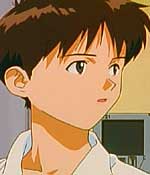by Ryan Mathews
|
Spanish Dubs
Since I began writing this column, I've received more than one query asking me if I was planning to review any
dubs in a language other than English. I thought that was a great idea. While still far from common, Spanish dubs
are beginning to appear more and more often on DVDs. The problem is that, despite four years of study in high school,
I'm anything but fluent in Spanish. (My Spanish teacher's thick American accent and unwillingness to ban English from
the classroom is, I'm sure, much to blame for this.) I felt uncomfortable reviewing dubs that were in a language I
couldn't understand.
Luckily, I had someone to turn to. I had recently made an online friend in Tijuana, Mexico. Blanca Alvarez,
an anime fan for several of her eighteen years, was more than happy to help out, especially since it meant I'd be
sending her samples of the anime in question.
The plan was as follows: We both watched the dubs. I formed an initial opinion based on how the characters
sounded and on the little Spanish I know. I then interviewed Blanca thoroughly via email and ICQ to get her
impressions, what she liked and disliked and most importantly, why. The results are below.
Rather than an in-depth look at a single dub, I will briefly touch upon three:
Bubble Gum Crisis Tokyo 2040
This is my favorite of the three dubs I watched, more by default than anything else, since there isn't anything
blatantly wrong or odd about it. One of the scenes I liked best was in the first episode, where Leon gets upset with
Nene for calling him "Leon-chan." There isn't any perfect equivalent in English, so the English dub goes with
"Leon-poo." The Spanish dub, on the other hand, has something that works perfectly: "Leoncito."
Unfortunately, Blanca didn't like Nene (Monica Villaseñor). She was annoyed by the character's tone of voice.
While she admitted it seemed right for Nene, it was nonetheless too high-pitched and squeaky for Blanca's taste.
That's actually a criticism I've heard of the Japanese actress for Nene as well.
We both liked Priss (Rebeca Manriquez) and Sylia (Teresa Ibarrola). Manriquez uses a calm, tough voice that
fits Priss perfectly. Blanca found Ibarrola's Sylia very mature and feminine. Recalling my sole problem with the
English dub actress, I asked Blanca for her opinion of the scene where a news report makes Sylia crack, breaking a
glass and bloodying her hand. Blanca thought the actress could have put a bit more feeling into the scene, but that
overall, it wasn't a bad read.
I was most amused by Blanca's opinion of Brian J. Mason (Jorge H Palafox). "I want a man with that voice!" she
said, calling Mason "very sexy." I didn't hear it myself, but then, I don't speak Spanish and I'm not a woman.
Neon Genesis Evangelion
Overall, this dub sounds good, but I had problems with it, some of which were supported by Blanca. One thing I
had to get used to while watching this dub was the concept of the title reader. This is a male voice that reads the
title of the anime, as well as any text that comes on the screen. In the case of "Evangelion," he gets a lot of work.
Often more text appears than can be read in the time available, so he reads very quickly. At the end of the episode,
he intones "Continuará" (to be continued). I thought it added a nice dramatic touch.
Both Blanca and I disliked Shinji (Victor Ugarte). For a character who's meant to have a very weak, yielding
personality, Ugarte portrays Shinji with a voice much too strong and forceful. A good example of this is the episode
in which he rescues his two friends from an attacking angel. In the original, Shinji says "I must not run away" over
and over in a low voice, as if it were a mantra. In the Spanish dub, Shinji declares "No debo escapar... ˇNo debo
escapar!" It's more of a call to arms than a mantra, and it's completely wrong for the character.
I liked Misato (Tony Rodríguez), and so did Blanca. However, Blanca thought Misato's happy squeal when she has
a beer could have been more convincing. Blanca had similar criticism for Ritsuko (Marú Guerrero), whom Blanca felt
needed work when expressing anger, such as when Ritsuko chews Misato out over the phone. Other than that small flaw,
Ritsuko was Blanca's favorite voice.
Rei (Circe Luna) sounded fine to my ears, but in Blanca's opinion, Luna gave the character a voice somewhat more
mature than the Japanese version. Blanca nonetheless gave the actress high marks though, saying the voice was "sweet,
calm, and quiet."
|
||||||||

